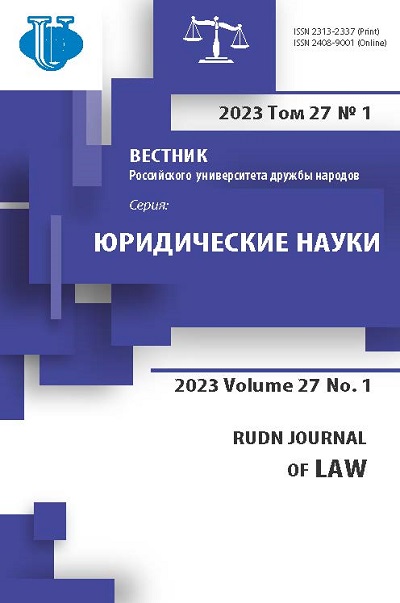Origin of written law
- Authors: Bekbaev E.Z.1
-
Affiliations:
- Eurasian Law Academy named after D.A. Kunaev
- Issue: Vol 27, No 1 (2023)
- Pages: 7-20
- Section: STATE AND LAW IN CONTEMPORARY WORLD
- URL: https://journals.rudn.ru/law/article/view/34054
- DOI: https://doi.org/10.22363/2313-2337-2023-27-1-7-20
- ID: 34054
Cite item
Full Text
Abstract
The relevance of the origin of written law issues stems from the need to address pluralism of concepts concerning law origin. Research investigates the issues of the origin of law as a set of rules of conduct fixed by the state in writing and intended for interaction of people between themselves and public authority represented by the state and other persons. In a primitive society the rules of behavior were fixed mainly in oral speech, which forced people to interact usually within the earshot of a person's voice. Oral speech could not be used for constant and everyday interaction between those groups of people who were far from each other in their camps and settlements. The written form of law and legal norms is an attributive feature of the legal system, consisting of law, legal relations and legal consciousness. The hypothesis suggests that law formation takes place in the process of establishing a written form by the state to a number of social norms of primitive society. Written law creates an additional opportunity for residents of different settlements, cities and countries to interact with each other at a distance; it contributes to centralization of state regulation in a certain territory, unification of social norms, and strengthening and expansion of state power.
Keywords
About the authors
Erzat Z. Bekbaev
Eurasian Law Academy named after D.A. Kunaev
Author for correspondence.
Email: erzat_bek@mail.ru
ORCID iD: 0000-0002-3958-2795
Doctor of Legal Sciences, Full Professor, Department of Constitutional, Iternational Law and Customs
107 Kurmangazy str., Almaty, 050022, Republic of KazakhstanReferences
- Berezkin, Y.Е. (2000) At the origins of Mesopotamian writing and the state. Archaeological News. (7), 334-338. (in Russian).
- Chiktybaiev, T.T. & Kaspaeva, R.S. (2021) Language as a method of representation, creation and implementation of law. Law and State. 3 (92), 128-141. https://doi.org/10.51634/2307-5201_2021_3_128 (in Russian).
- Frolov, S.N. (2007) The connection between the concepts of the origin of law and types of legal understanding. Abstract. of Dis. … Cand. of legal sciences. Moscow, Moscow University of the Ministry of Internal Affairs of the Russian Federation. (in Russian).
- Grevtsov, Yu.I. (1981) Problems of the theory of legal relations. Leningrad, Leningrad State University named after A.A. Zhdanova. (in Russian).
- Kuzischin, V.I. (ed.). (2002) History of the Ancient East. Texts and documents: Textbook. Moscow, Higher school Publ. (in Russian).
- Korelskiy, V.M. & Perevalov, V.D. (eds.). (1998) Theory of State and Law. Moscow, Norma Publ. (in Russian).
- Muromtsev, G.I. (2021) Law genesis: problems of methodology. RUDN Journal of Law. 25(2), 359-375. https://doi.org/10.22363/2313-2337-2021-25-2-359-375 (in Russian).
- Nersesyants, V.S. (ed.) (1999) Problems of the general theory of law and the state: Textbook for universities. Moscow, NORMA-INFRA-M Publ. (in Russian).
- Plyusnin, Y.M. (1990) The problem of biosocial evolution: Theoretical and methodological analysis. Novosibirsk, Nauka. Siberian branch Publ. 1990. 240 p. (in Russian).
- Syrykh, V.M. (2016) Socialogy of law: textbook. 5th ed., rev. and add. Moscow, Justichia Publ. (in Russian).
- Schmandt-Besserat, D. (1992) Before Writing. Vol. I: From Counting to Cuneiform. Foreword by William W. Hallo. University of Texas Press, Austin.
- Vengerov, A.B. (2005) Theory of the state and law: A textbook. 2nd ed. Moscow, Omega-L Publ. (in Russian).
Supplementary files















